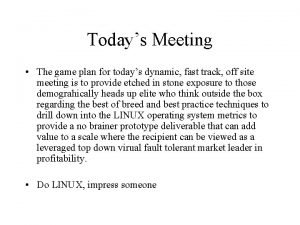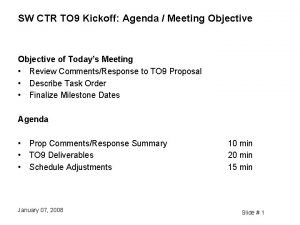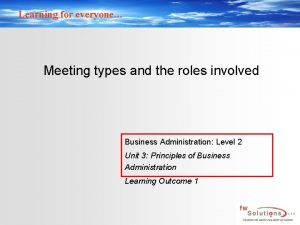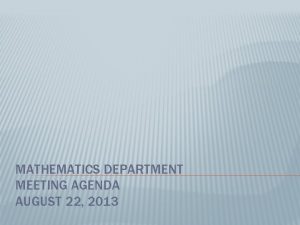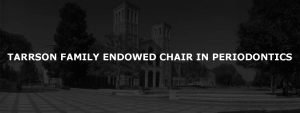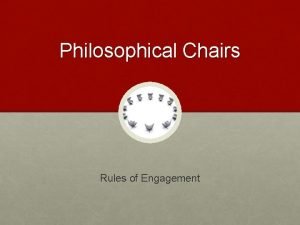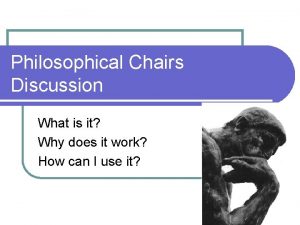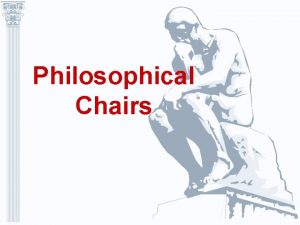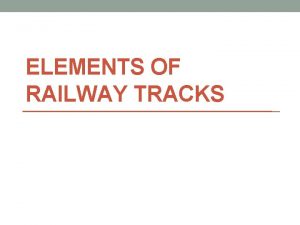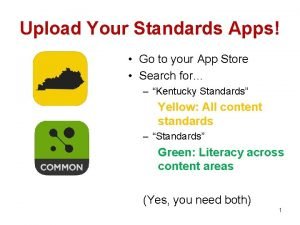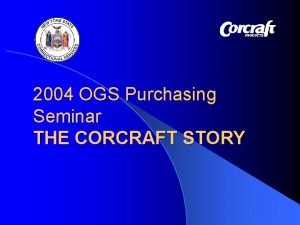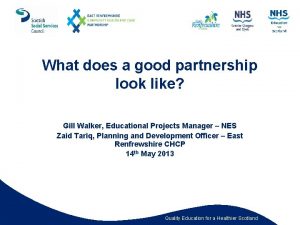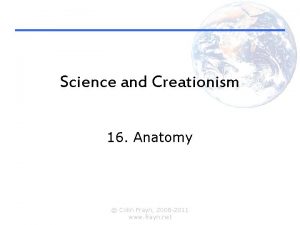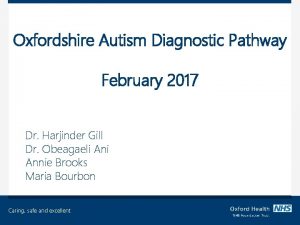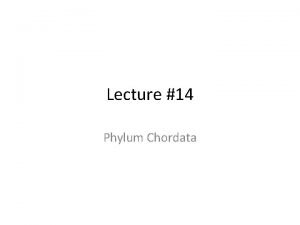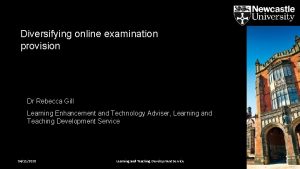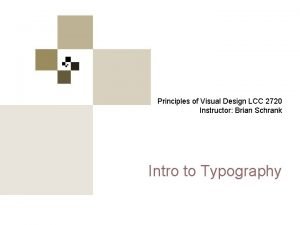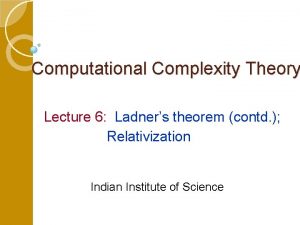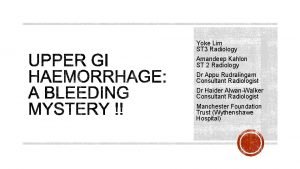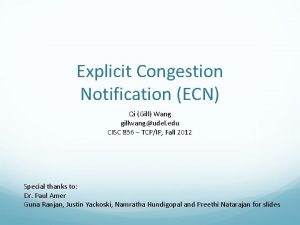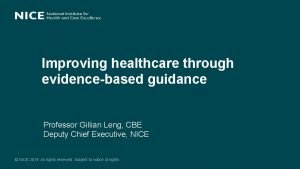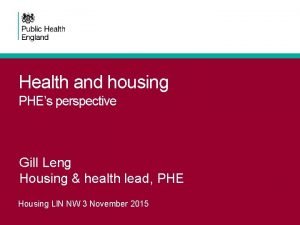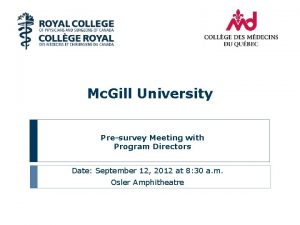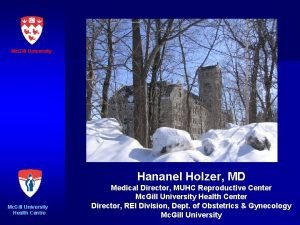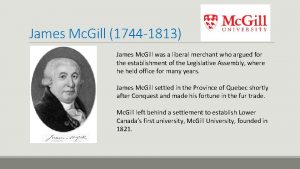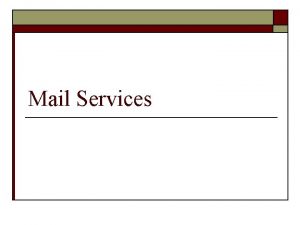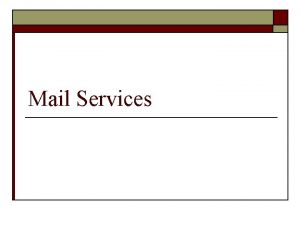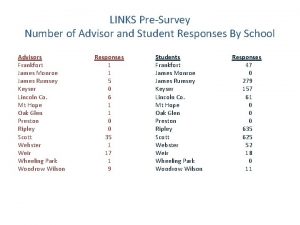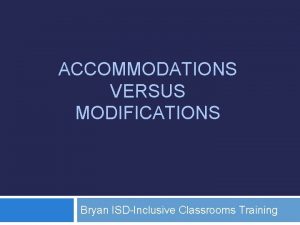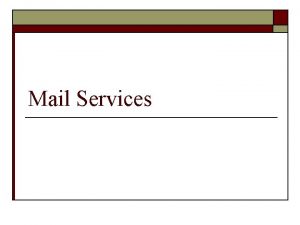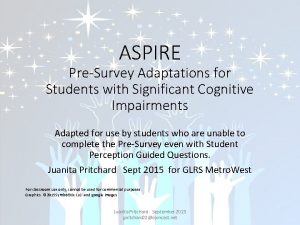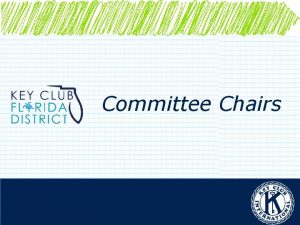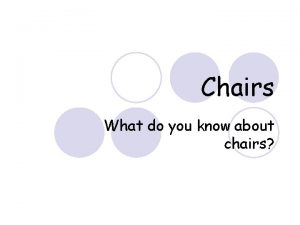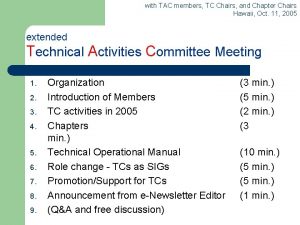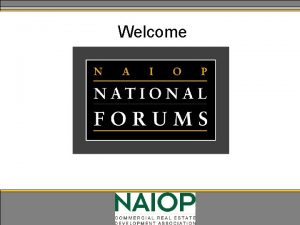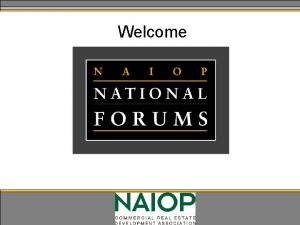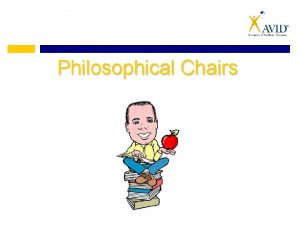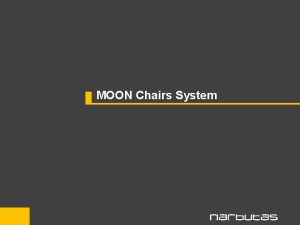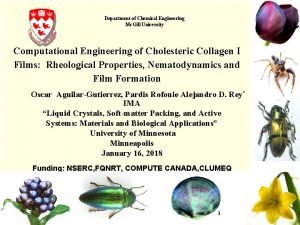Mc Gill University Presurvey Meeting with Department Chairs




















































- Slides: 52

Mc. Gill University Pre-survey Meeting with Department Chairs Date: September 12, 2012 at 1: 30 p. m. Carp Conference Room, Goodman Building

Objectives of the Meeting To review the: • • • Accreditation Process New Categories of Accreditation Standards of Accreditation Pilot Accreditation Process Role of the: – Program director – Department chairs – Residents

Conjoint Visit • • • Planning Organization Conduct Share the cost One decision taken at the Royal College Accreditation Committee 3

Collège des médecins du Québec Mission • To promote quality medicine so as to protect the public and help improve the health of Quebecers. Since 1847 • In Quebec, legal responsibility for the accreditation of residency programs is assigned to the CMQ pursuant to regulations made under the Loi médicale and the Code des professions. 4

Royal College of Physicians and Surgeons of Canada Mission • To improve the health and care of Canadians by leading in medical education, professional standards, physician competence and continuous enhancement of the health system. Since 1929 • A special Act of Parliament established The Royal College of Physicians and Surgeons of Canada to oversee postgraduate medical education for medical and surgical specialties. 5

Accreditation • Is a process to: – Improve the quality of postgraduate medical education – Provide a means of objective assessment of residency programs for the purpose of Royal College accreditation – Assist program directors in reviewing conduct of their program • Based on Standards 6

The Accreditation Process • • • Based on General and Specific Standards Based on Competency Framework On-site regular surveys Peer-review Input from specialists Categories of Accreditation 7

Pilot Accreditation Process Mc. Gill University is one of three universities participating in a pilot accreditation process! • Survey will be conducted in two distinct parts: – A Standards review – B Standards review • Details for the pilot process will be discussed later in presentation 8

Six-Year Survey Cycle 1 6 5 2 Monitoring 4 Internal Reviews 3

Process for Pre-Survey Questionnaires University Questionnaires Specialty Committee Comments Royal College Comments Program Director 10 Questionnaires & Comments Surveyor

Role of the Specialty Committee • Prescribe requirements for specialty education – – – Program standards Objectives of training Specialty training requirements Examination processes FITER • Evaluates program resources, structure and content for each accreditation review • Recommends a category of accreditation to the Accreditation Committee 11

Composition of a Specialty Committee • Voting Members (chair + 5) – Canada-wide representation • Ex-Officio Members – Chairs of exam boards – National Specialty Society (NSS) • Corresponding Members – ALL program directors 12

The Survey Team • Chair - Dr. Mark Walton – Responsible for general conduct of survey • Surveyors • Resident representatives – FMRQ • Regulatory authorities representative - CMQ 13

Information Given to Surveyors • Questionnaire (PSQ) and appendices – Completed by program • Program-specific Standards (OTR/SSA) • Report of last regular survey • Specialty Committee comments – Also sent to PGD / PD prior to visit • Exam results for last six years • Reports of mandated Royal College/CMQ reviews since last regular survey, if applicable 14

The Survey Schedule • Document review (30 min) • Residency Program Committee minutes • Resident assessment files • Meetings with: • • • 15 Program director (75 min) Department chair (30 min) Residents (per group of 20 - 60 min) Teaching staff (60 min) Residency Program Committee (60 min)

Meeting Overview • Program director • Overall view of program • Address each Standard • Time & support • Department chair • • Support for program Concerns regarding program Resources available to program Research environment • Teaching faculty • Involvement with residents • Communication with program director 16

Meeting with ALL Residents • Topics to discuss with residents – – – 17 Objectives Educational experiences Service /education balance Increasing professional responsibility Academic program / protected time Supervision Assessments of resident performance Evaluation of program / assessment of faculty Career counseling Educational environment Safety

The Recommendation • Survey team discussion – Evening following review • Feedback to program director – Exit meeting with surveyor • Morning after review – 07: 30 – 07: 45 at the Fairmont The Queen Elizabeth – Survey team recommendation • Category of accreditation • Strengths & weaknesses 18

Categories of Accreditation New terminology • Revised and approved by the Royal College, CFPC and CMQ in June 2012. 19

Categories of Accreditation Accredited program • Follow-up: – Next regular survey – Progress report within 12 -18 months (Accreditation Committee) – Internal review within 24 months – External review within 24 months Accredited program on notice of intent to withdraw accreditation • Follow-up: – External review conducted within 24 months 20

Categories of Accreditation Definitions • Accredited program with follow-up at next regular survey – Program demonstrates acceptable compliance with standards. 21

Categories of Accreditation Definitions • Accredited program with follow-up by College-mandated internal review – Major issues identified in more than one Standard – Internal review of program required and conducted by University – Internal review due within 24 months 22

Categories of Accreditation Definitions • Accredited program with follow-up by external review – Major issues identified in more than one Standard AND concerns • • • are specialty-specific and best evaluated by a reviewer from the discipline, OR have been persistent, OR are strongly influenced by non-educational issues and can best be evaluated by a reviewer from outside the University – External review conducted within 24 months – College appoints a 2 -3 member review team – Same format as regular survey 23

Categories of Accreditation Definitions • Accredited program on notice of intent to withdraw accreditation – Major and/or continuing non-compliance with one or more Standards which calls into question the educational environment and/or integrity of the program – External review conducted by 3 people (2 specialists + 1 resident) within 24 months – At the time of the review, the program will be required to show why accreditation should not be withdrawn. 24

After the Survey Reports SURVEY TEAM Report & Response n Re co ROYAL COLLEGE m m en d at io Reports & Responses SPECIALTY COMMITTEE ACCREDITATION COMMITTEE 25 Reports Responses UNIVERSITY

The Accreditation Committee • Chair + 16 members • Ex-officio voting members (6) – – Collège des médecins du Québec (1) Medical Schools (2) Resident Associations (2) Regulatory Authorities (1) • Observers (9) – – – – 26 Collège des médecins du Québec (1) Resident Associations (2) College of Family Physicians of Canada (1) Regulatory Authorities (1) Teaching Hospitals (1) Resident Matching Service (1) Accreditation Council for Graduate Medical Education (2)

Information Available to the Accreditation Committee • All pre-survey documentation available to surveyor • Survey report • Program response • Specialty Committee recommendation • History of the program 27

The Accreditation Committee • Decisions – Accreditation Committee meeting • June 2013 • Dean & postgraduate dean attend – Sent to • University • Specialty Committee • Appeal process is available 28

General Standards of Accreditation “A” Standards • Apply to University, specifically the PGME office “B” Standards • Apply to EACH residency program • Updated January 2011 29

“A” Standards for University & Education Sites A 1 A 2 University Structure Sites for Postgraduate Medical Education A 3 Liaison between University and Participating Institutions 30

“B” Standards for EACH residency program B 1 B 2 B 3 B 4 B 5 B 6 31 Administrative Structure Goals & Objectives Structure and Organization of the Program Resources Clinical, Academic & Scholarly Content of the Program Assessment of Resident Performance

B 1 – Administrative Structure There must be an appropriate administrative structure for each residency program. • Qualifications of, and support for program director • • Membership = resident(s) + faculty Responsibilities • • • 32 Operation of program Program & resident evaluations Appeal process Selection of candidates Process for teaching & evaluating competencies Research

B 1 – Administrative Structure “Pitfalls” • Program director autocratic • Residency Program Committee dysfunctional – Unclear Terms of Reference (membership, tasks and responsibilities) • Agenda and minutes poorly structured • Poor attendance – Department chair unduly influential – RPC is conducted as part of a Dept/Div meeting • No resident voice 33

B 2 – Goals and Objectives There must be a clearly worded statement outlining the Goals & Objectives of the residency program. • • • Rotation-specific Address all Can. MEDS Roles Functional / used in: • • • Planning Resident evaluation Distributed to residents & faculty 34

B 2 – Goals and Objectives “Pitfalls” • Missing Can. MEDS roles in overall structure – Okay to have rotations in which all Can. MEDS roles may not apply (research, certain electives) • Goals and objectives not used by faculty/residents • Goals and objectives dysfunctional – does not inform evaluation • Goals and objectives not reviewed regularly 35

B 3 – Structure & Organization There must be an organized program of rotations and other educational experiences to cover the educational requirements of the specialty. • • • Increasing professional responsibility Senior residency Service responsibilities, service / education balance Resident supervision Clearly defined role of each site / rotation Educational environment 36

B 3 – Structure & Organization “Pitfalls” • Graded responsibility absent • Service/education imbalance – Service provision by residents should have a defined educational component including evaluation • Educational environment poor 37

B 4 – Resources There must be sufficient resources – Specialty-specific components as identified by the Specialty Committee. • • • Number of teaching faculty Number of variety of patients and operative procedures Technical resources Resident complement Ambulatory/ emergency /community resources/experiences 38

B 4 – Resources “Pitfalls” • Insufficient faculty for teaching/supervision • Insufficient clinical/technical resources • Infrastructure inadequate 39

B 5 – Clinical, Academic & Scholarly Content of Program The clinical, academic and scholarly content of the program must prepare residents to fulfill all Roles of the specialist. • Educational program • Curriculum / structure - • • • Content specific areas defined by Specialty Committee Can. MEDS Roles Teaching of the individual competencies Resident / faculty participation in conferences 40

B 5 – Clinical, Academic & Scholarly Content of Program “Pitfalls” • Organized academic curriculum lacking or entirely resident driven – Poor attendance by residents and faculty • Teaching of essential Can. MEDS roles missing • Role modelling is the only teaching modality 41

B 6 – Assessment of Resident Performance There must be mechanisms in place to ensure the systematic collection and interpretation of evaluation data on each resident. • Assessment must be • • 42 Regular, timely, formal Face-to-face Based on objectives Include multiple evaluation techniques

B 6 – Assessment of Resident Performance “Pitfalls” • Mechanism to monitor, promote, remediate residents lacking • Formative feedback not provided and/or documented • Evaluations not timely (particularly when serious concerns identified), not face to face • Summative evaluation (ITER) inconsistent with formative feedback, unclearly documents concerns/weaknesses 43

Learning Environment What are the processes in place to resolve problems / issues? Appropriate faculty / resident interaction and communication must take place in an open and collegial atmosphere so that a free discussion of the strengths and weaknesses of the program can occur without hindrance. 44

Pilot Accreditation Process Conducted in two separate visits • PGME and teaching sites – A Standards – November 25 -27, 2012 • Residency programs – B Standards – March 17 -22, 2013 45

Pilot Accreditation Process ALL residency programs • Complete PSQ • Undergo a review, either by – On-site survey, or – PSQ/documentation review, and input from various stakeholders Process varies depending on group • Mandated for on-site survey • Eligible for exemption from on-site survey • Selected for on-site survey 46

Programs Mandated for On-site Survey Scheduled for On-site Review in March 2013 Criteria • Core specialties – General Surgery, Internal Medicine, Obstetrics & Gynecology Pediatrics, Psychiatry • Palliative Medicine – Conjoint Royal College/CFPC program • Program Status – Not on full approval since last regular survey – New program which has not had a mandated internal review conducted 47

Process for Programs Mandated for On-site Review Process remains the same • PSQ Review – Specialty Committee • • • On-site survey by surveyor Survey team recommendation Survey report Specialty Committee Final decision by Accreditation Committee – Meeting in June 2013 – Dean & postgraduate dean attend 48

Programs Eligible for Exemption from On-site Review Criteria • Program on full approval since last regular on-site survey 49

Process for Programs Eligible for Exemption • PSQ and documentation review – Accreditation Committee reviewer – Specialty Committee • Recommendations to exempt – – Accreditation Committee reviewer Specialty Committee Postgraduate dean Resident organization (FMRQ) • Steering Committee (AC) Decision – Review of recommendations • Exempted: on-site survey not required • Not exempted: program scheduled for on-site survey in March – Selected program (random) – University notified in December 2012 50

Contact Information ROYAL COLLEGE accred@royalcollege. ca 613 -730 -6202 COLLÈGE DES MÉDECINS DU QUÉBEC mlamer@cmq. org 514 -933 -4441 Office of Education Direction des études médicales Margaret Kennedy Assistant Director Accreditation & Liaison Dr. Anne-Marie Mac. Lellan Director Lise Dupéré Manager, Educational Standards Unit Sylvie Lavoie Survey Coordinator 51 Marjolaine Lamer Coordinator Mélanie Caron Accreditation Agent

 Mc gill university
Mc gill university Zhou
Zhou For todays meeting
For todays meeting Today meeting or today's meeting
Today meeting or today's meeting What is meeting and types of meeting
What is meeting and types of meeting What is meeting and types of meeting
What is meeting and types of meeting Math department meeting agenda
Math department meeting agenda Meeting minutes
Meeting minutes Ucla endowed chairs
Ucla endowed chairs Rail fixture
Rail fixture Planmeca compact classic
Planmeca compact classic Philosophical chairs rules of engagement
Philosophical chairs rules of engagement Philosophical chairs rules of engagement
Philosophical chairs rules of engagement Topics for philosophical chairs
Topics for philosophical chairs Three bears chairs
Three bears chairs One and three chairs
One and three chairs Joseph kosuth: one and three chair barnett newman
Joseph kosuth: one and three chair barnett newman Wearable chairs
Wearable chairs Philosophical chairs
Philosophical chairs Philosophical chairs topics
Philosophical chairs topics Horizon europe mission soil health and food
Horizon europe mission soil health and food Advantages of flat footed rails
Advantages of flat footed rails Mun phrases
Mun phrases Kieron's cats solution
Kieron's cats solution Philosophical chairs sentence starters
Philosophical chairs sentence starters Corcraft chairs
Corcraft chairs Shaan gill
Shaan gill Gill walker speaks
Gill walker speaks Tarjinder gill
Tarjinder gill Tom gill md
Tom gill md Gill pouches in humans
Gill pouches in humans Gill ellis- young
Gill ellis- young Jaiya gill
Jaiya gill Dr harjinder gill
Dr harjinder gill R v gill 1963
R v gill 1963 Phylum
Phylum Rivali gill harveyova osnova
Rivali gill harveyova osnova Gill cover
Gill cover Gill arches
Gill arches Dr. rebecca gill
Dr. rebecca gill Arthur eric gill
Arthur eric gill Camille gill
Camille gill Visual principles
Visual principles Gill valentine
Gill valentine Ladner's theorem
Ladner's theorem Summerpal singh gill
Summerpal singh gill Gill wang
Gill wang Manmeet gill
Manmeet gill Campbell biology 9th edition powerpoints
Campbell biology 9th edition powerpoints Bensen fan md
Bensen fan md Gillian leng
Gillian leng Gill leng
Gill leng Gill maggot
Gill maggot


